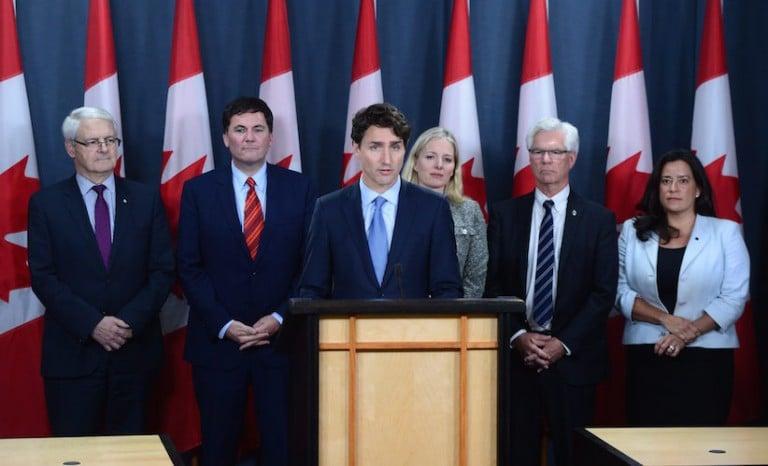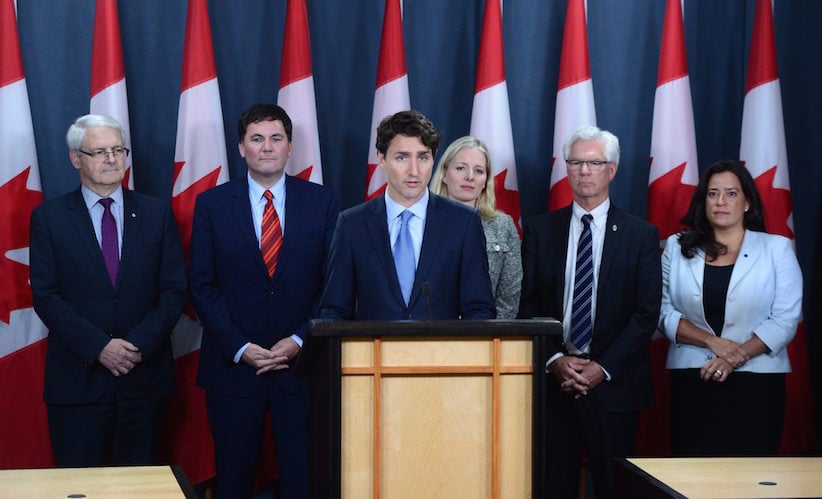Trudeau, a ‘grandson of B.C.’, makes his pipeline case
Breaking down Trudeau’s Trans Mountain pipeline speech, where he claims B.C. roots, argues for economic transition, and says it’s better than rail

Prime Minister Justin Trudeau holds a press conference at the National Press Theatre in Ottawa on Tuesday, Nov. 29, 2016, announcing that his government would approve two pipeline projects. (Sean Kilpatrick/CP)
Share

Prime Minister Justin Trudeau announced three pipeline decisions today, but make no mistake about which one matters most, at least as far as politics and protest are concerned. His decision to approve Kinder Morgan’s plan to twin its existing Trans Mountain pipeline from Edmonton to Burnaby, B.C., just up the shore from Vancouver, is the call Trudeau was alluding to today when he admitted many British Columbians will be “bitterly disappointed.”
Of course, there will be disappointment in other quarters, too, over his simultaneous decision to kill Enbridge’s proposed Northern Gateway pipeline in northern B.C., even though he allowed the company’s far less contentious upgrade of a pipeline from Alberta to Wisconsin to go ahead. But the Kinder Morgan project raises the politically daunting prospect of angry, determined opposition from environmentalists.
MORE: Why Trudeau and the oil industry are losing the pipeline battle
In his news conference today, three things Trudeau said carried the main burden of his case for what is arguably his most controversial policy move to date as Prime Minister.
A personal narrative
Political strategists often argue that a leader’s own story is more potent than mere facts in trying to build popular approval. Trudeau claimed credibility today on the pipeline file largely because of his emotional bonds with B.C. He has often spoken in the past of his closeness as a child with his grandfather, James Sinclair, the father of his mother Margaret Trudeau. Sinclair was an outgoing Liberal MP from Vancouver back in the 1950s. Trudeau also worked as a teacher in Vancouver as a young man. Here’s how he invoked those chapters of his life story as a self-professed “grandson of B.C.”:
“We understand and share an abiding sense of responsibility British Columbians feel for our spectacular West Coast. Indeed, it is a personal issue for me. I spent much of my childhood with my grandparents on the coast and on the water. I worked and lived in B.C. for years as a teacher. Now, I have heard and listened very carefully to the many diverse perspectives that exist in B.C. on this project. Indeed, one of its most articulate and substantive critics is a colleague, [B.C. Liberal MP] Terry Beech. Others will be opposed to this project for their own reasons. We respect that… But to them and to all Canadians I want to say this: If I thought this project was unsafe for the B.C. coast, I would reject it.”
MORE: The tremendous political cost of approving Trans Mountain
An economy in transition
Last spring at the Vancouver Convention Centre, which happens to overlook the Burrard Inlet—where tankers pass by loaded with crude oil brought to the coast by the Trans Mountain Pipeline—Trudeau talked a lot about the “transition” of Canada’s energy economy. He was there trying to persuade the premiers to sign on to a carbon price, and repeatedly argued that Canada must invest in the fossil fuel sector to help generate the wealth needed to shift to a low-carbon economy. It can sound awkward, but he touched on that point again and again today, using the word “transition” many times in his news conference. Here he suggests the shift to a green economy doesn’t mean declining to exploit oil reserves:
“To fund this change toward a carbon-free world, we have to create good jobs and generate strong economic growth. Canada is a country rich in energy of all kinds, conventional and renewable; the energy of today, and tomorrow. That is a unique and tremendously positive place to be in the world. I have said many times that there isn’t a country in the world that would find billions of barrels of oil and leave it in the ground while there is a market for it… Our challenge is to use today’s wealth to create tomorrow’s opportunity.”
A sense of inevitability
A big part of the political problem Trudeau now faces is that he defeated a prime minister last fall who was so closely identified with the Alberta oil and gas sector. In voting to oust Stephen Harper, many Canadians thought the sense of inevitability in the expansion of the oil sands, in particular, could be banished too. But, as Trudeau’s reference in the previous quote to how no country would leave that oil in the ground suggests, his Liberals also see development as to some degree unstoppable. In fact, Trudeau’s third key point today was that, even if he had rejected Kinder Morgan, that diluted bitumen will make its way to markets anyway.
“The fact is oil sands production is going to increase in the coming years. Because we are at capacity in terms of existing pipelines, that means more oil is going to be transported by rail in the coming years if we don’t build pipelines. That is less economic, it is more dangerous for communities, and it is higher in greenhouse gas emissions than modern pipelines would be. This is all about demonstrating that we understand that getting resources to market safely, in a way that respects our responsibilities toward the environment, toward future generations, but does it in a way that is anchored in science, not rhetoric.”
Watch John Geddes and Evan Solomon discuss pipeline politics and much more in our weekly live politics show, Crosstalk. Watch it live—and join the conversation with questions of your own—on Wednesday at 9:50 AM ET. Subscribe here to be notified when we go live.